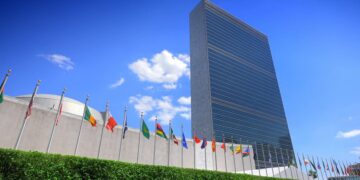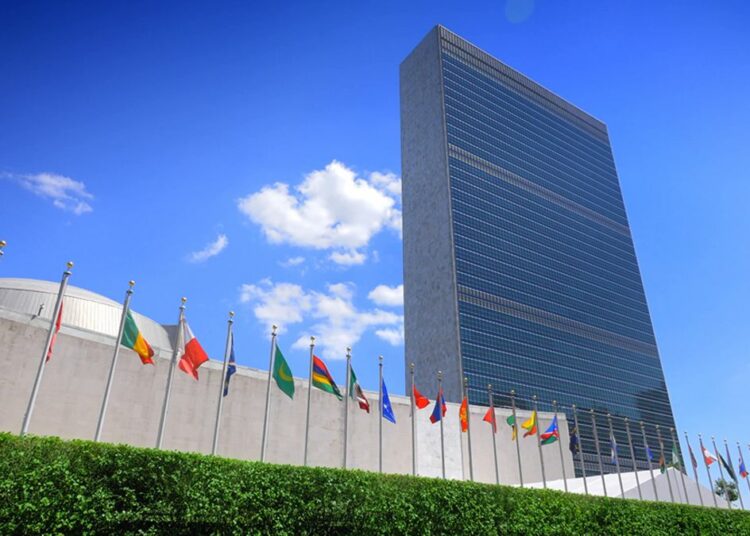In commemoration of the 75th anniversary of the founding of the United Nations, IOF has provided the following statement to ambassadors and their missions in New York.
UN@75: A Time to Reaffirm Life and Family
When this year’s General Assembly is the stuff of history, it will not be its celebration of the UN’s 75th anniversary that most stands out but rather the fact that for the first time ever, the General Assembly was conducted as a virtual event. As the global pandemic continues to take lives and ravage economies, humanity has turned homeward for solace and safety in a poignant reminder of the preciousness of life and family—foundational pillars affirmed by powerful voices heard in the United Nations since its beginning.
Voices for Life
Anchored in the unalienable Creator-endowed right to life is the 1945 UN Charter’s aspiration to “reaffirm faith in fundamental human rights, in the dignity and worth of the human person” (preamble), a goal advanced when the 1948 Universal Declaration of Human Rights acknowledged “the inherent dignity” and “equal and inalienable rights of all members of the human family” (preamble) and insisted, “Everyone has the right to life, liberty and security of person” (article 3). The UN left no doubt about the scope of this right when in its 1959 Declaration of the Rights of the Child it recognized that “the child, by reason of his physical and mental immaturity, needs special safeguards and care, including appropriate legal protection, before as well as after birth” (preamble).
One of the most impassioned pleas for the unborn came in 1985 when a diminutive nun named Mother Teresa warned the General Assembly that “abortion has become the greatest destroyer of peace…. [I]f we really want peace,… we will not allow a single child to feel unwanted, to feel unloved.” She urged that the “terrible law of killing the innocents, of destroying life, destroying the presence of God, be removed from our country, from our nation, from our people, from our families.” Not long thereafter, the 1989 Convention on the Rights of the Child, quoting the Declaration on the Rights of the Child, reiterated in its preamble the child’s need for special care and legal protection both before and after birth.
In 1994, the International Conference on Population and Development announced, “In no case should abortion be promoted as a method of family planning” (paragraph 8.25), an instruction repeated by the 1995 Fourth World Conference on Women (paragraph 106-k). Nearly a quarter of a century later, US president Donald Trump told the 2019 General Assembly that “every child—born and unborn—is a sacred gift from God,” and that Americans will “never tire of defending innocent life… Global bureaucrats have absolutely no business attacking the sovereignty of nations that wish to protect innocent life.”
Voices for the Family
Voices in the UN proclaiming the priority of family have been equally clear, as when article 16 of the Universal Declaration of Human Rights, in the only acknowledgment of anything beyond individual rights, recognized that the family is “entitled to protection by society and the State” because it is “the natural and fundamental group unit of society.” Iterations of this description resound in over a hundred national constitutions and various UN outcome documents, while the description is repeated verbatim by the 2006 Convention on the Rights of Persons with Disabilities (preamble) and by two 1966 treaties, the International Covenant on Civil and Political Rights (article 23.1) and the International Covenant on Economic, Social and Cultural Rights, with the latter emphasizing the level of protection to which this natural and fundamental group unit is entitled: “The widest possible protection and assistance should be accorded to the family” (article 10.1).
It was at the 2004 celebration of the 10th anniversary of the International Year of the Family that the General Assembly was told by Secretary-General Kofi Annan, “Concern for the well-being of families dates back to the earliest days of the United Nations…. This anniversary is an opportunity to reaffirm the importance and centrality of the family…. Governments need to do more to help families adapt and thrive…. We must not forget that the family is a vital partner in efforts to achieve the Millennium Development Goals and the many other objectives set by the international community during the last decade.” The family’s indispensable role in development was further emphasized by His Excellency Iftekhar Chowdhury of Bangladesh, who observed, “The attainment of every Millennium Declaration Goal must begin with the family. The family is the main instrument of societal transformation.”
Speaking at that same 2004 event, US representative Wade Horn explained why the family is fundamental: “Throughout the ages, political philosophers, social historians, and civic and religious leaders have praised the family as the foundation of the social order, the bedrock of nations, and the bastion of civilization…. The fact is that family is a universal and irreplaceable community, rooted in human nature and the basis for all societies at all times. As the cradle of life and love for each new generation, the family is the primary source of personal identity, self-esteem, and support for children. It is also the first and foremost school of life, uniquely suited to teach children integrity, character, morals, responsibility, service, and wisdom…. The state’s foremost obligation… is to respect, defend, and protect the family as an institution.”
The vital role of the family was further emphasized by the coalition of nations known as the Group of Friends of the Family, which in 2015 told the UN, “We are convinced that the sustainability of communities and societies largely rests on the strength of the family as a basic unit of society and the natural environment for the growth and well-being of all its members, particularly children. We recognize the vital role of the family in attaining the internationally agreed development goals and confirm our commitment to enhance the contribution of the families in the efforts to achieve sustainable development goals by promoting family-oriented policies.”
A Time to Reaffirm Family and Life
We urge that the foundational principles articulated by these powerful voices stand as a bulwark against all contrary policies—of which there continue to be far too many—advocated in the United Nations. The virtual gathering of UN Member States on 21 September 2020 in commemoration of the 75th anniversary is scheduled to proceed under the officially designated theme, “The Future We Want, the UN We Need: Reaffirming our Collective Commitment to Multilateralism.” We recommend that the theme be expanded to include, “The Future We Want, the World We Need: Reaffirming our Collective Commitment to Life and Family”—a commitment that will enable unprecedented progress for every other worthwhile objective of the United Nations.
International Organization for the Family
Center for Family and Human Rights
United Families International
Latin American Alliance for the Family
Family Policy Institute, South Africa
Family First, New Zealand
Novae Terrae Foundation, Italy
CitizenGo, Spain
Real Women of Canada
Provive, Venezuela
Institute for Family Policy, Spain
American Family Association of New York
FamilyPolicy.RU Advocacy Group, Russia
Native American Fatherhood and Families Association




















Discussion about this post